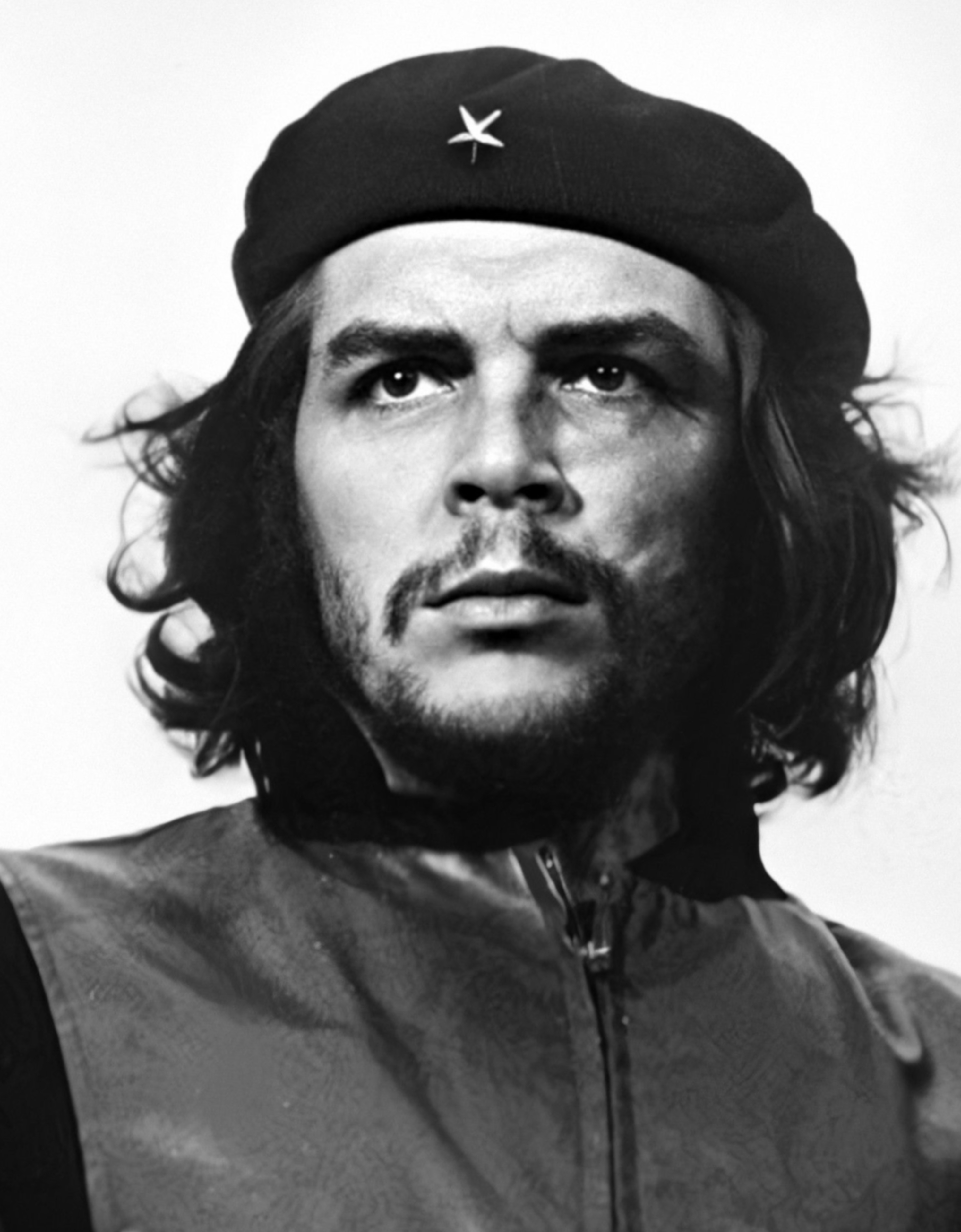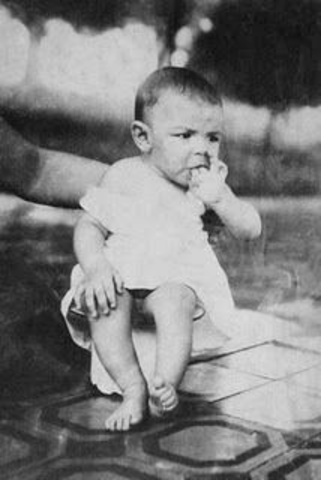More languages
More actions
(Added to Early life) Tag: Visual edit |
m (Improved text and linking. Redlinked the shit out of everything.) Tag: Visual edit |
||
| Line 6: | Line 6: | ||
| image_alt = | | image_alt = | ||
| caption = Portrait of comrade Che | | caption = Portrait of comrade Che | ||
| nationality = Argentinian | | nationality = [[Argentine Republic|Argentinian]] | ||
| birth_name = Ernesto Guevara | | birth_name = Ernesto Guevara | ||
| birth_date = {{birth date|1928|6|14}} | | birth_date = {{birth date|1928|6|14}} | ||
| birth_place = Rosario, Santa Fé Province, Argentina | | birth_place = Rosario, Santa Fé Province, [[Argentine Republic|Argentina]] | ||
| death_date = {{death date and age|1967|10|9|1928|6|14}} | | death_date = {{death date and age|1967|10|9|1928|6|14}} | ||
| death_place = La Higuera, Vallegrande Province, Bolivia | | death_place = La Higuera, Vallegrande Province, [[Plurinational State of Bolivia|Bolivia]]. | ||
| death_cause = | | death_cause = Capture and execution by the Bolivian state | ||
| political_line = [[Marxism-Leninism]] | | political_line = [[Marxism-Leninism]] | ||
}} | }} | ||
'''Ernesto''' "'''Che'''" '''Guevara''' {{Datebio|birthday=14th|birthmonth=June|birthyear=1928|deathday=9th|deathmonth=October|deathyear=1967}} was a [[Latin America|Latin-American]] [[Marxism–Leninism|Marxist-Leninist]] revolutionary and a leader of the [[Cuban Revolution]], alongside [[Fidel Castro]]. During his time in the government of [[Republic of Cuba|Cuba]], he was appointed president of the Central Bank of Cuba in 1959 and later Minister of Industry in 1961.<ref>{{Textcite|author=Richard L. Harris|year=2011|chapter=Timeline: events in the life of Che Guevara|title=Che Guevara: a biography|isbn=978-0-313-35916-3|city=Santa Barbara, Califonia|publisher=Greenwood|lg=http://libgen.rs/book/index.php?md5=E894F200B27B2693CC5B5229B5DE50A3}}</ref> | '''Ernesto''' "'''Che'''" '''Guevara''' {{Datebio|birthday=14th|birthmonth=June|birthyear=1928|deathday=9th|deathmonth=October|deathyear=1967}} was a [[Latin America|Latin-American]] [[Marxism–Leninism|Marxist-Leninist]] revolutionary and a leader of the [[Cuban Revolution]], alongside [[Fidel Castro]]. During his time in the government of [[Republic of Cuba|Cuba]], he was appointed president of the [[Central Bank of Cuba]] in 1959 and later Minister of Industry in 1961.<ref>{{Textcite|author=Richard L. Harris|year=2011|chapter=Timeline: events in the life of Che Guevara|title=Che Guevara: a biography|isbn=978-0-313-35916-3|city=Santa Barbara, Califonia|publisher=Greenwood|lg=http://libgen.rs/book/index.php?md5=E894F200B27B2693CC5B5229B5DE50A3}}</ref> | ||
Che was part of an expedition led by [[Fidel Castro]] that directed the armed struggle against the [[United States imperialism|US-backed]] [[Republic of Cuba|Cuban]] dictator Fulgencio Batista. Guevara also presided over Cuban delegations that visited various countries and was a representative of the revolutionary government in important international conclaves. During the October Crisis he was appointed military chief of the province of Pinar del Río. | Che was part of an expedition led by [[Fidel Castro]] that directed the [[armed struggle]] against the [[United States imperialism|US-backed]] [[Republic of Cuba|Cuban]] dictator [[Fulgencio Batista]]. Guevara also presided over Cuban delegations that visited various countries and was a representative of the revolutionary government in important international conclaves. During the October Crisis he was appointed military chief of the province of Pinar del Río. | ||
In 1965 Che left Cuba to set up guerrilla forces first in the Congo and then later in Bolivia, where he was ultimately captured and killed in October 1967. Accounts of his execution have varied over the years, but many contemporary accounts indicate some degree of collaboration between Bolivia's government troops and the [[United States of America|United States]] [[Central Intelligence Agency|CIA]]. Che Guevara developed a theory of primacy of military struggle, in particular concept of guerilla ''foquismo''. Many of Che's theories regarding guerilla tactics are articulated in his 1961 work "[[Guerilla warfare (Che Guevara work)|Guerilla Warfare]]." | In 1965 Che left Cuba to set up guerrilla forces first in the [[Republic of Congo|Congo]] and then later in [[Plurinational State of Bolivia|Bolivia]], where he was ultimately captured and killed in October 1967. Accounts of his execution have varied over the years, but many contemporary accounts indicate some degree of collaboration between Bolivia's government troops and the [[United States of America|United States]]' [[Central Intelligence Agency|CIA]]. Che Guevara developed a theory of primacy of military struggle, in particular concept of guerilla ''foquismo''. Many of Che's theories regarding guerilla tactics are articulated in his 1961 work "[[Guerilla warfare (Che Guevara work)|Guerilla Warfare]]." | ||
== History == | == History == | ||
=== Early life in Argentina === | === Early life in Argentina === | ||
Ernesto Guevara was born to his father Ernesto Guevara Lynch and his mother Celia de la Serna y Llosa in the city of Rosario, Argentina on May 14th, 1928, despite his birth certificate recording his birth a month later. His mother got pregnant before she was married to his father and they hid baby Che from their families for one month after he was born.<ref>{{Textcite|author=Jon Lee Anderson|year=2010|title=Che Guevara: a revolutionary life|chapter=A plantation in Misiones|isbn=978-0-8021-9725-2|publisher=Grove Press|lg=http://libgen.rs/book/index.php?md5=3E3E1D3A68BF27293A12BC1076076C7B}}</ref> Che spoke with a typical La Plata accent, common in Uruguay, south of Brazil and the | [[File:Che Guevara 1928.png|thumb|alt=|224x224px|Baby Ernesto Guevara in 1928]] | ||
Ernesto Guevara was born to his father Ernesto Guevara Lynch and his mother Celia de la Serna y Llosa in the city of Rosario, [[Argentine Republic|Argentina]] on May 14th, 1928, despite his birth certificate recording his birth a month later. His mother got pregnant before she was married to his father and they hid baby Che from their families for one month after he was born.<ref name=":0">{{Textcite|author=Jon Lee Anderson|year=2010|title=Che Guevara: a revolutionary life|chapter=A plantation in Misiones|isbn=978-0-8021-9725-2|publisher=Grove Press|lg=http://libgen.rs/book/index.php?md5=3E3E1D3A68BF27293A12BC1076076C7B}}</ref> Che spoke Spanish with a typical La Plata accent, common in the regions of [[Uruguay]], south of [[Federative Republic of Brazil|Brazil]] and the northeast region of Argentina, which makes frequent use of the interjection "che" in the speech. This characteristic accent would render Guevara's nickname "Che".<ref name=":1">{{Textcite|author=I. Lavretsky|year=1976|title=Ernesto Che Guevara|chapter=First steps|publisher=Progress Publishers|lg=http://libgen.rs/book/index.php?md5=3DA588DC804F57A9857A5A563BB5D2A3}}</ref> | |||
=== | Che Guevara's mother had [[Kingdom of Spain|Spanish]] descent, from the Argentine colonial era nobility, and his father had [[Ireland|Irish]] descent, also from an artistocratic family.<ref name=":1" /><ref name=":0" /> During his childhood, Che developed chronic asthma, which would afflict his health for his whole life.<ref name=":0" /> | ||
=== | ===The motorcycle diaries=== | ||
=== | ===Guatemala and Mexico=== | ||
=== | ===Cuban Revolution=== | ||
=== The | ===The Congo diary=== | ||
== | ===The Bolivian diary=== | ||
== | == Works== | ||
=== '' | ===''Guerilla warfare''=== | ||
=== '' | ===''Reminiscences of the Cuban revolutionary war''=== | ||
== | ===''On revolutionary medicine''=== | ||
==Bibliography== | |||
== References == | *Richard L. Harris (2011). ''Che Guevara: a biography.'' Santa Barbara, Califonia: Greenwood. ISBN 978-0-313-35916-3 ([http://libgen.rs/book/index.php?md5=E894F200B27B2693CC5B5229B5DE50A3 Library Genesis link]) | ||
*Fidel Castro (2006). ''Che: a memoir.'' Melbourne: Ocean Press. ISBN 978-1-921700-83-5 ([http://libgen.rs/book/index.php?md5=99FF4ED3FDF1F4BDB79D3CCFB39EAB66 Library Genesis link]) | |||
*Jon Lee Anderson (2010). ''Che: a revolutionary life.'' Grove Press. ISBN 978-0-8021-9725-2 ([http://libgen.rs/book/index.php?md5=3E3E1D3A68BF27293A12BC1076076C7B Library Genesis link]) | |||
==References== | |||
<references /> | |||
Revision as of 13:02, 16 June 2021
Ernesto Guevara | |
|---|---|
 Portrait of comrade Che | |
| Born | Ernesto Guevara June 14, 1928 Rosario, Santa Fé Province, Argentina |
| Died | October 9, 1967 (aged 39) La Higuera, Vallegrande Province, Bolivia. |
| Cause of death | Capture and execution by the Bolivian state |
| Nationality | Argentinian |
| Political orientation | Marxism-Leninism |
Ernesto "Che" Guevara (June 14th, 1928 — October 9th, 1967) was a Latin-American Marxist-Leninist revolutionary and a leader of the Cuban Revolution, alongside Fidel Castro. During his time in the government of Cuba, he was appointed president of the Central Bank of Cuba in 1959 and later Minister of Industry in 1961.[1]
Che was part of an expedition led by Fidel Castro that directed the armed struggle against the US-backed Cuban dictator Fulgencio Batista. Guevara also presided over Cuban delegations that visited various countries and was a representative of the revolutionary government in important international conclaves. During the October Crisis he was appointed military chief of the province of Pinar del Río.
In 1965 Che left Cuba to set up guerrilla forces first in the Congo and then later in Bolivia, where he was ultimately captured and killed in October 1967. Accounts of his execution have varied over the years, but many contemporary accounts indicate some degree of collaboration between Bolivia's government troops and the United States' CIA. Che Guevara developed a theory of primacy of military struggle, in particular concept of guerilla foquismo. Many of Che's theories regarding guerilla tactics are articulated in his 1961 work "Guerilla Warfare."
History
Early life in Argentina

Ernesto Guevara was born to his father Ernesto Guevara Lynch and his mother Celia de la Serna y Llosa in the city of Rosario, Argentina on May 14th, 1928, despite his birth certificate recording his birth a month later. His mother got pregnant before she was married to his father and they hid baby Che from their families for one month after he was born.[2] Che spoke Spanish with a typical La Plata accent, common in the regions of Uruguay, south of Brazil and the northeast region of Argentina, which makes frequent use of the interjection "che" in the speech. This characteristic accent would render Guevara's nickname "Che".[3]
Che Guevara's mother had Spanish descent, from the Argentine colonial era nobility, and his father had Irish descent, also from an artistocratic family.[3][2] During his childhood, Che developed chronic asthma, which would afflict his health for his whole life.[2]
The motorcycle diaries
Guatemala and Mexico
Cuban Revolution
The Congo diary
The Bolivian diary
Works
Guerilla warfare
Reminiscences of the Cuban revolutionary war
On revolutionary medicine
Bibliography
- Richard L. Harris (2011). Che Guevara: a biography. Santa Barbara, Califonia: Greenwood. ISBN 978-0-313-35916-3 (Library Genesis link)
- Fidel Castro (2006). Che: a memoir. Melbourne: Ocean Press. ISBN 978-1-921700-83-5 (Library Genesis link)
- Jon Lee Anderson (2010). Che: a revolutionary life. Grove Press. ISBN 978-0-8021-9725-2 (Library Genesis link)
References
- ↑ Richard L. Harris (2011). 'Timeline: events in the life of Che Guevara' in Che Guevara: a biography. Santa Barbara, Califonia: Greenwood. ISBN 978-0-313-35916-3 [LG]
- ↑ 2.0 2.1 2.2 Jon Lee Anderson (2010). 'A plantation in Misiones' in Che Guevara: a revolutionary life. Grove Press. ISBN 978-0-8021-9725-2 [LG]
- ↑ 3.0 3.1 I. Lavretsky (1976). 'First steps' in Ernesto Che Guevara. Progress Publishers. [LG]
